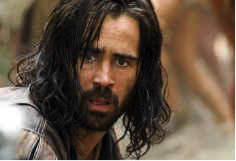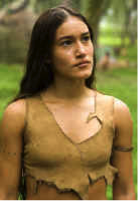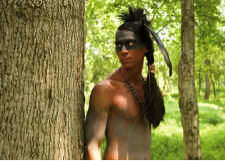By: debbie lynn elias

Poetic, epic and sweeping, writer/director Terrence Malick brings to the big screen yet another incarnation of the settlement and colonization of the Virginias and the love story of John Smith and Native American, Pocahontas, in “The New World.” Unfortunately, this retelling of this chapter in America’s history is still as boring as it was for me some 40 years ago sitting in an elementary school classroom. And considering Malick finished the script some 30+ years ago and had it sitting on a shelf gathering dust, perhaps it was for him, too. (Disney at least had the right idea by sprucing things up with animation and song.) Rumored to be on a scale as grand as Titanic, I must say Malick succeeded – if he was going for the events of the ship and not the success of James Cameron’s film.
 The time is 1607. British explorers have just arrived on the shores of America on what is to become the Virginias. Under the leadership of Captain Christopher Newport, the Susan Constant and its crew of wayward British explorers and scalawag was hired by the Virginia Company to establish colonies in the New World. With travel accommodations not what we have today (although these new no frills airline policies may come close), the seafarers suffer scurvy and other diseases, hunger, dirt, filth, rats and even mutiny during their long voyage. And being an intelligent man with some forethought, Captain Newport wisely elected to spare the mutinous John Smith from a hanging, not wishing to cut his manpower of 100 by even 1.
The time is 1607. British explorers have just arrived on the shores of America on what is to become the Virginias. Under the leadership of Captain Christopher Newport, the Susan Constant and its crew of wayward British explorers and scalawag was hired by the Virginia Company to establish colonies in the New World. With travel accommodations not what we have today (although these new no frills airline policies may come close), the seafarers suffer scurvy and other diseases, hunger, dirt, filth, rats and even mutiny during their long voyage. And being an intelligent man with some forethought, Captain Newport wisely elected to spare the mutinous John Smith from a hanging, not wishing to cut his manpower of 100 by even 1.
Newly arrived on the shores of America, the crew is met by Native Americans, or Naturals, as they were called by the white man. With their curiosity satisfied, the Naturals go back deep into their territory, leaving the Brits to set up housekeeping near shore. Finding colonization not an easy task, Captain Newport returns to England for more supplies and manpower, but not before he orders John Smith to meet with Chief Powhatan, “King” of the Naturals, hoping to have a smooth war-free colonization. A problem from start to finish, Smith soon finds himself facing yet another hanging (or worse) when he wanders deep into Natural territory. Captured, it is only because of the blinded-by-love infatuation of Pocahontas that Smith is released by Powhatan, who just happens to be a sucker for his daughter’s wishes.
Obsessed with Pocahontas and concerned for the harm that might come to her from her own people because of her love for Smith and the risks she takes for the settlers, Smith accepts an assignment in the Northern Territory leaving instructions to tell the now-puritanized Rachel nee Pocahontas that he is dead, leading to the final chapter in what could have been an inspiring interpretation of history and legend.
Colin Farrell steps in as John Smith. Much as he did in “Alexander”, Farrell just “is.” As cold and immobile as the smoothest alabaster, he evokes no emotion, no sense of adventure, mutiny or challenge. Not a chink in his armor. This is a new land, a new world. Untouched by the white man. One would think there would be some inquisitive enthusiasm, but there isn’t. If Malick intended the actors to be backdrops to the harmonious beauty of the land, he succeeded. If the visuals were to be a backdrop to the actors, he failed miserably. Christian Bale and Christopher Plummer are the two acting highlights. Bale, as British tobacco farmer, John Rolfe , is a bit better than Farrell, but not thanks to the script. Bale just has a better presence and thus, shows a bit more interest in the environs. But speaking of presence, Christopher Plummer is a standout as Captain Newport. Incomparable, his very essence speaks authority and serves him well here. Newcomer Q’Orianka Kilcher is the nubile beauty who plays Pocahontas and by all accounts, there is no disputing the camera loves her. With the carefree spirit of a child, Kilcher oozes sexuality beyond her years making for at times, uncomfortable viewing, given the nature of history itself (Pocahontas was 12 when she met Smith.)
 Broken into essentially three segments, the work is poorly written with incoherent storytelling and completely unrealistic characterization. It’s not long before you find yourself checking your watch (much like the classroom clock) wondering how much longer must you suffer through the tedium. Concentrating on the visual expansiveness of “The New World” Malick sacrifices history and good storytelling, focusing intently on leaping and prancing Naturals in a beauteous land, much like Shakespeare’s mythical and fanciful creations in “A Midsummer’s Nights Dream.” Complete with protracted shots of rocks and rills, lush greenery and tress wistfully bending in the wind, I was waiting for Julie Andrews to emerge singing Alpine songs.
Broken into essentially three segments, the work is poorly written with incoherent storytelling and completely unrealistic characterization. It’s not long before you find yourself checking your watch (much like the classroom clock) wondering how much longer must you suffer through the tedium. Concentrating on the visual expansiveness of “The New World” Malick sacrifices history and good storytelling, focusing intently on leaping and prancing Naturals in a beauteous land, much like Shakespeare’s mythical and fanciful creations in “A Midsummer’s Nights Dream.” Complete with protracted shots of rocks and rills, lush greenery and tress wistfully bending in the wind, I was waiting for Julie Andrews to emerge singing Alpine songs.
Visually impacting, there is no denying the beauty of the land and false sense of peaceable security created by the cinematography of Emmanuel Lubezki which is complimented by the melodious undertones of James Horner’s score (Yes, the Oscar winning “Titanic” composer.) Both eloquent and understated, Horner’s score is the compelling force keeping you in your seat for the duration. The combination of the work of these two men is almost zen-like.
Despite the film’s hypnotic lushness and beauty, not even that can save it from itself. Coming in at a mere 150 minutes (yawn), you may find yourself wishing you were on the Titanic. At least you would have an iceberg to save you from the frustrating boredom.
Colin Farrell: John Smith Christopher Plummer: Captain Newport Christian Bale: John Rolfe Q’Orianka Kilcher: Pocahontas
Written and directed by Terrence Malick. A New Line Cinema release. Rated PG-13. (150 min)
Photos © 2006 – New Line Cinema All Rights Reserved











